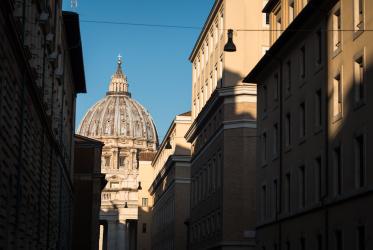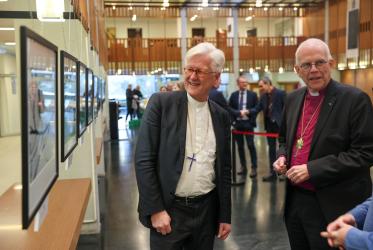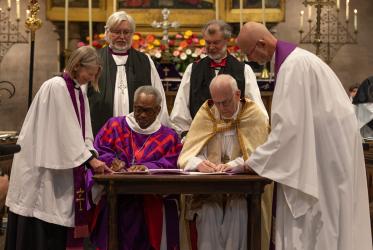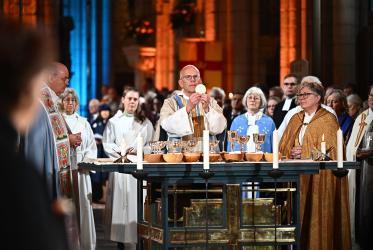Joint Working Group 50 years
Rome, 23 June 2015
In the years after my retirement as a diocesan bishop, I have spent some time writing ecumenical history including a biography of the founder of the Life and Work movement Nathan Söderblom. This summer 90 years have passed since the Universal Christian Conference on Life and Work was held in Stockholm in 1925. With a clear vision and incredible perseverance the Swedish Archbishop Nathan Söderblom succeded bringing the churches of the Reformation and a number of Eastern Orthodox churches together for a joint contribution to peace and social justice. This happened after the immense devastation of the World War I. The modern ecumenical movement was born in response to human disaster. Söderblom truly believed in spiritual ecumenism not infringing on confession, ecclesial structures or liturgical expression. Respecting the individuality of churches, his concept of unity was spacious and non-dogmatic. Authentic spirituality centred on the cross of Christ would unite all believers for common action. Life and Work became a cornerstone in an ecumenical venture, which turned the churches from enmity and divergence toward mutuality and convergence. Any demand for superiority or uniformity was rejected; what he strived for was a free cooperation for peace and justice, all for the life of the world.
The Roman Catholic Church had also been invited to participate but declared its non possumus, and provoked by Stockholm 1925 and the Faith and Order conference in Lausanne 1927 Pope Pius XI in 1928 promulgated the encyclical letter Mortalium Animos on ”Fostering true religious union”. Its attitude was uncompromising, rejecting all efforts to bring about an ecumencial dialogue. People involved with ecumenism were accused not only of error; they distorted the true idea of religion, and thus rejected it. Only one way forward was offered: a return to the Catholic Church and an unconditional subordination to Rome. Söderblom responded with humble conviction that a church should recognize the catholicity of the other and cooperate even if they were not fully united. His extensive dialogue with Fr. Max Pribilla, S.J. clarified the positions but as Söderblom passed away in 1931 the debate never reached any conclusion. This was long before Vatican II with its Decree on Ecumenism (Unitatis Redintegratio, 1962) dramatically changed the ecumenical scene.
As we are gathered for the 50th anniversary of the Joint Working Group almost a century later, many of us would affirm Söderblom’s deeply grounded spiritual ecumenism and his plea for practical cooperation in spite of ecclesial diversity. In the years since Mortalium Animos the world has changed and so have indeed the churches. I remember my own bishop returning from the Council, where he was one of the Lutheran observers, telling us what was in the making. Then and there my own ecumenical journey started, culminating with participation the Joint Working Group. Today we could not even imagine the mutual condemnations in the 1920’s, even less understand how it was at all possible not to meet and build bot personal and ecclesial relations.
In the ecumenical process the Joint Working Group has played a key role. It was not always very visible and much publicized, but this official commission, humbly named as were it an informal group, has continuously measured the ecumenical temperature and served as a laboratory for ecumenical dialogue and cooperation. The structured and sustained relationship between the World Council of Churches and the Roman Catholic Church has been documented in nine reports. They are now ecumenical history and a manifestation of both vision and venture, problems and prospects, commitment and convergence. The Joint Working Group has been, if not a trail blazing operation, an indispensable instrument for furthering the call to visible unity
During its eight mandate (1999-2005) I had the privilege of serving as co-moderator together with Archbishop Mario Conti of Glasgow. There was a certain mistrust on both sides. The Catholic Church had chosen not to participate fully in the JPIC process (Justice, Peace and the Integrity of Creation) leading up to the convocation I Seoul. In many of the Protestant churches there was a re-affirmation of confessional identity. Among the Orthodox criticism of ecumenical involvement was mounting. American conservative evangelicalism was gaining ground at the expense of more ecumenical mainline Protestantism.
At the same time a number of decisive events and developments took place both in the Catholic Church and in the fellowship of the World Council. With the encyclical Ut Unum Sint (1995), pope John Paul II had given rich nourishment and a renewed vision to the whole ecumenical movement. The Jubilee Year 2000 provided opportunities for deep spiritual sharing, both at the opening of the Holy Door, the ecumenical commemoration of the witnesses of faith in the 20th century, and at the beginning of the third millennium. Although the document Dominus Jesus (2001) cooled much ecumenical enthusiasm, a consultation at the 40th anniversary of the Joint Working Group strongly affirmed both dialogue and cooperation. For the World Council this period was marked by the reflection on “a Common Understanding and Vision of the WCC”, an attempt at reconfiguration of the ecumenical movement as a whole, the creation of a Global Christian Forum including Christian communities outside the Council, and not least of a renewal of structured relationships with the Orthodox churches. At times severe internal problems in the Catholic Church as well as the World Council spilled over into our deliberations and caused sharp words, but mutual trust and theological integrity stood the test. There was, to be sure, much frustration in the group, but when our report finally was presented to the parent bodies, wee were all both proud and grateful
It is the task of the Joint Working Group to follow ecumenical developments, encourage new initiatives, analyse and act whenever Christian unity could be strengthened in the life, liturgy and teaching of the church. The Joint Working Group has at many occasions encouraged its parent bodies more bravely to explore creative possibilities and to propose new steps and programmes. Over the years there has been substantial cooperation in many areas, but the fact remains that the Joint Working Group has dealt more with what could be defined as matters of Faith and Order rather than Life and Work. The agenda has been too narrow and the ecumenical approach not comprehensive enough. With the great and inspiring encyclical of Pope Francis on the environmental crisis , Laudato Si´, a new platform for wide and committed cooperation has beren offered, as environmental concerns have been on the agenda of the World Council for decades and since many years a priority of the Ecumenical Patriarchate. As the General Secretary Olav Fykse Tveit put it: “This encyclical proves to all that these are matters at the heart of our Christian faith, and that we as Christians should address them together as issues of justice and peace. This is the time to focus on our shared responsibility as human beings, and the way we as churches should support those who are ready to make the required changes.” I would add that the encyclical opens for joint theological reflection on integral ecology and the holy sacraments as signs of holiness, healing and wholeness in the wounded world. Ecumenical energy and commitment has been ceasing in large segments of Catholic, Orthodox and Protestant Christianity. The environmental crisis is a man-made disaster of immense proportions. It urgently calls for common theological reflection and joint action as did the devastation of human culture one hundred years ago.
After fifty years of sharing information, building mutual trust and strengthening the foundation for common action, the Joint Working Group will face new challenges and make an even greater contribution to the fulfilment of the ecumenical calling. Spiritual ecumenism could liberate Christians for a vision even greater than the visible unity of the church; what is asked for is no less than a full recognition of the unity and integrity of God’s creation.
Jonas Jonson is bishop emeritus of the diocese of Strängnäs in the Church of Sweden. He has been actively involved in the life and work of the WCC for more than 50 years.




